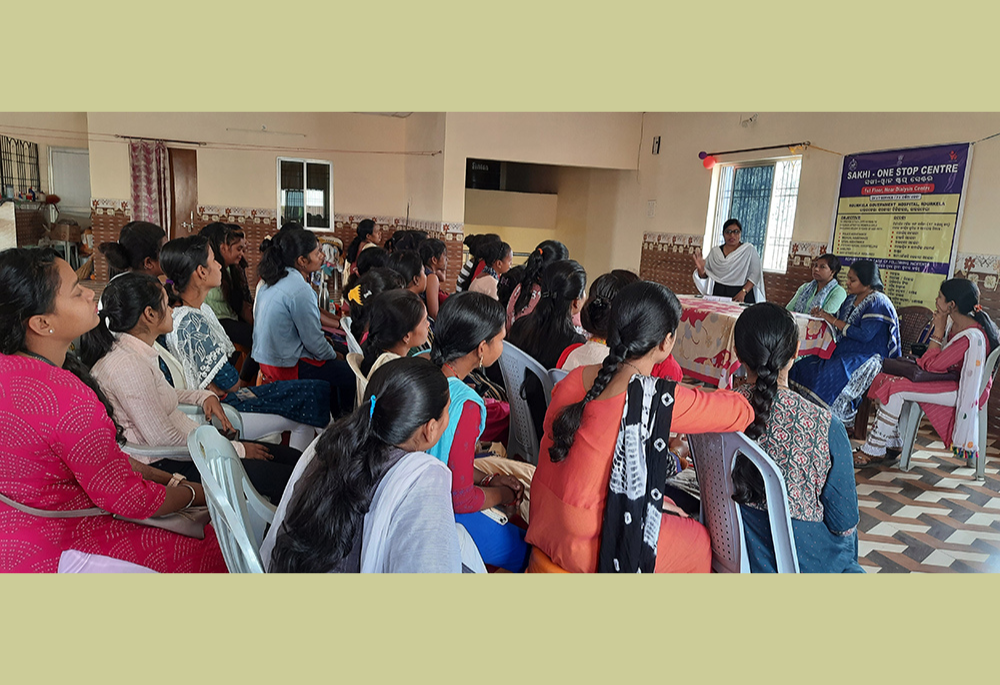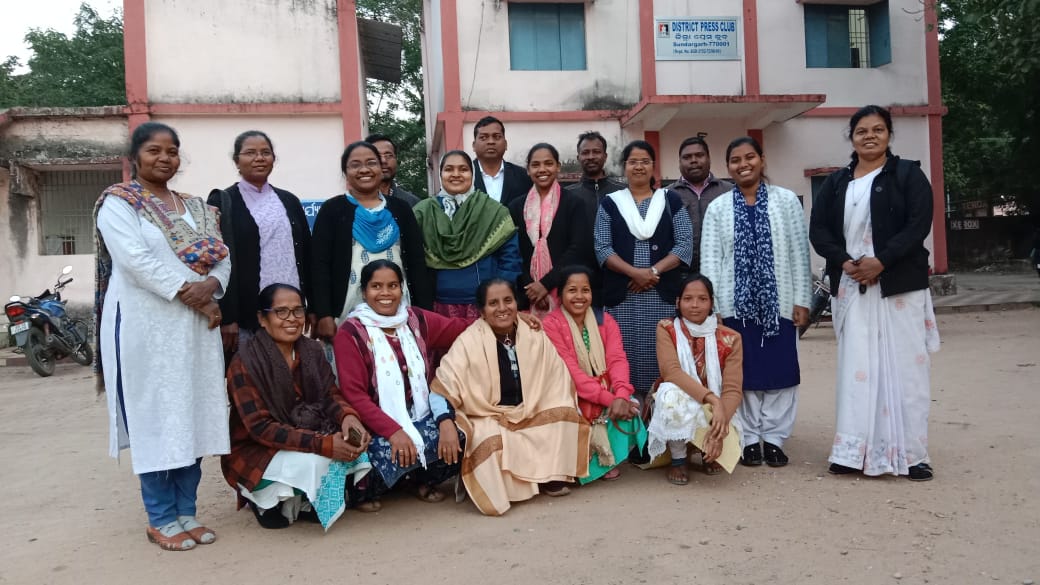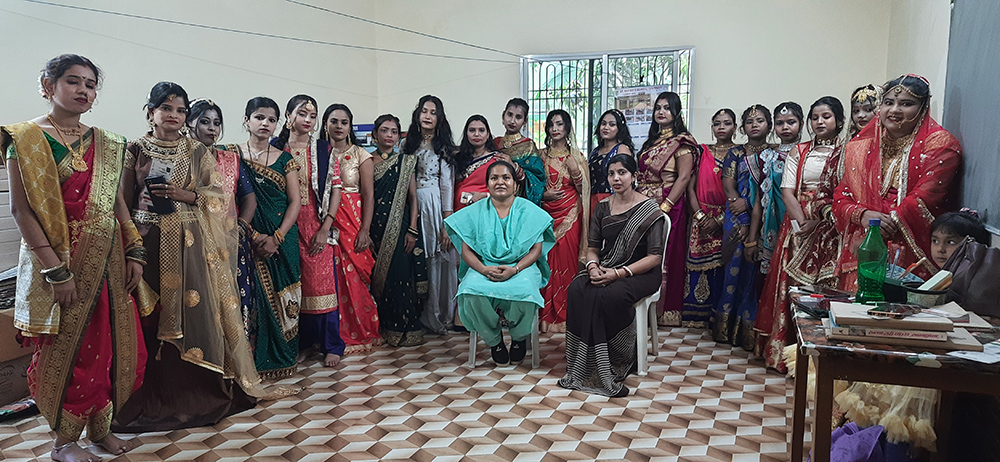
Missionary Sisters Servants of the Holy Spirit Sr. Anita Bandod conducts an awareness program for young women about the risk and challenges of migration, and the safety measures and assistance available in case of danger. (Courtesy of Tessy Jacob)
Editor's note: On Feb. 8, the Catholic Church recognizes the International Day of Prayer and Awareness Against Human Trafficking, established in 2015 by Pope Francis on the feast day of St. Josephine Bakhita, the patron saint of Sudan and victims of human trafficking, whose story of slavery has become an inspiration to fight this modern-day exploitation. To participate in the International Day of Prayer and Awareness Against Human Trafficking, click here.
The mother of a young girl felt immense happiness when her stepsister offered to take her young daughter, a minor, to a faraway metro city for work.
For years, the woman's stepsister had been working as domestic help. So, the mother, a widow managing the errands of the family with meager income from daily wages, was relieved that her young daughter would now also be able to earn an income. The duo left for the city, but after a few months, the young girl became untraceable.
Her mother, who suffered silently due to a lack of finance and manpower, mustered courage years later to go in search of her daughter.
At first, she attempted to do it alone. Gradually, nonprofit organizations and individuals joined her search. Unfortunately, her daughter was not found, and she did not obtain a satisfactory answer about her wellbeing.
She ended the search, thinking her daughter would return home one day, from the place that was supposed to be a "safe haven." The young girl's employers and her mother's stepsister were unaffected by the missing girl.
This is not an isolated incident of human trafficking; thousands of families across the world are living in agony over their missing son, daughter or spouse. The United Nations provides chilling statistics that reveal human trafficking as modern slavery, and much more rampant than we could ever imagine.
Advertisement
Newspapers carry stories of rescued laborers subjected to hazardous conditions, where they were made to work round the clock without food, rest or deserving wages. These vulnerable men and women become the scapegoats of someone else's selfishness. Someone's agony is another's profit!
Odisha, one of India's Eastern states, faces the massive migration of its middle-class population to other cities in India in search of jobs, mainly in the unskilled sector. Factors such as low literacy rate, layoff seasons due to seasonal cultivation, lack of employment paths, and the allure of modern living urge its citizens to migrate to other cities, often illegally.
Although the government has made it mandatory for the migrating population to record their whereabouts with a government desk for their safety and additional benefits, most people often evade it, due to the process and lack of awareness. Definitely, no one sets out for a trafficking trap, but many end up falling prey to con artists.
The nuances of trafficking are very complex, and it may not be a "single individual" getting trapped, but often, groups of men are kept in siege for bonded labor. These instances, akin to a holocaust experience for victims, highlight the savage behavior of fellow human beings. The vulnerability of people is exploited.
For instance, two minor siblings working in a brickmaking factory decided to return home, due to hazardous labor and maltreatment. Unfortunately, on the way home, one succumbed to ill health due to the poor working conditions he had been enduring. A young life was lost, denied of deserved human dignity and reward. Often, families are unaware of their wards' whereabouts, and not everyone is able to save their kin from human trafficking.
Human trafficking is a global evil, ranging from illegal cross-border migration to the flesh trade. It is no one's choice, but it is the fate of some of our brothers and sisters. It is an ongoing issue for which even international organizations cannot find a permanent solution. However, a little care, a little more awareness, and shedding the "Am I my brother's keeper?" syndrome can reduce the intensity of this evil.

Religious sisters who are part of the Arise Foundation, a network organization for safe migration and protection. (Courtesy of Tessy Jacob)
Recognizing that migration is necessary for the economic development of society, and the need to accompany people in safely choosing their workplaces, sisters from different religious congregations in Odisha and Jharkhand formed a "Migrant Help Desk" for safe migration. Christian tribal populations from these two states constitute a massive number of unskilled laborers in different parts of the country. The Migrant Help Desk is broadly networking with another safe migration foundation, "Arise," nationwide. Religious nuns spearhead the activities, along with like-minded governmental and nongovernmental organizations. It was a noble and timely intervention from the church, considering the surging concerns about the safety of women due to increasing cases of duping, exploitation and flesh trade.
These two bureaus focus on raising awareness about trafficking, providing legal assistance to the families and victims, helping migrants stay connected with others in their vicinity, and assisting them in returning to their places in case of unwanted incidents.
This initiative is a significant help for many youngsters, people who are semiliterate, and stranded workers. It is a network of religious power, where human power, existing infrastructure, technology, and the dedicated and impromptu services of individuals are tapped and resourced towards a mission. A creative and timely move, stemming from the feeling of "I am my neighbor's keeper!"

Sr. Anita Bandod is pictured with young women trained in beautician courses, displaying their efficiency in bridal makeovers. In response to the incidents of human trafficking, Missionary Sisters Servants of the Holy Spirit initiated skill training programs based on current trends, like the beautician courses. (Courtesy of Tessy Jacob)
As much as it is necessary to keep people from migrating, retaining human power is vital to avoid brain and resource drain. Some rural villages lack the young generation, affecting the care of senior citizens, agricultural labor and social capital. Unless young people have better employment opportunities, they will seek better prospects beyond their rural living.
In response to the unfortunate incidents of human trafficking victimizing young women, Missionary Sisters Servants of the Holy Spirit took proactive steps by initiating skill training programs based on the current trends. The beautician courses proved to be a crowd-drawing sector with decent return profit. These courses also appealed to young women, due to their creativity, aesthetic sense, and a being a sought-after profession.
Feb. 8, the International Day of Prayer and Awareness against Human Trafficking, calls our attention to be vigilant of what is happening to our neighbors. It could be that the domestic workers in our neighborhood may be experiencing trauma. A woman we encounter on the streets might be in desperate need of protection. A child following you without saying a word might need help, or a youngster in the corner of the train could be under threat. We may not always be aware — human trafficking manifests in many forms. In addition to prayer and fasting, the church encourages everyone to be advocates for promoting human life and not ignore trafficking.







